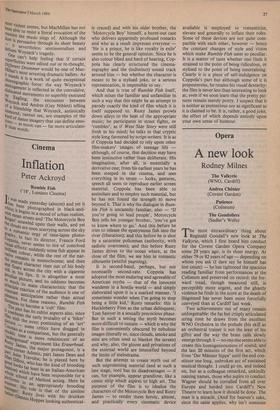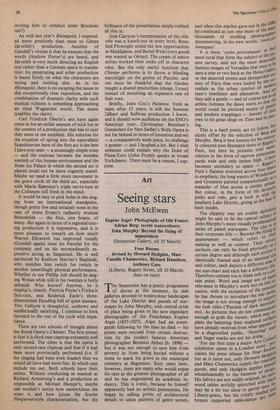Opera
A new look
Rodney Milnes
The Valkyrie (WNO, Cardiff) Andrea Chenier (Covent Garden) Patience (Coliseum) The Gondoliers (Sadler's Wells)
The most extraordinary thing about Reginald Goodall's new look at The Valkyrie, which I first heard him conduct for the Covent Garden Opera Company some 29 years ago, is its sheer energy. At either 79 or 82 years of age — depending on whom you ask (I dare say he himself has lost count) — he has tightened the spacious reading familiar from performances at the Coliseum and preserved on record: the for- ward tread, though measured still, is perceptibly more urgent, and the ghastly violence he finds in the score at the death of Siegmund has never been more forcefully conveyed than at Cardiff last week.
Two achievements out of many remain unforgettable: the fat but crisply articulated string tone he draws from the excellent WNO Orchestra in the prelude (his skill as an orchestral trainer is not the least of his gifts) and the way the brass calls slowly emerge through it — no one else seems able to create this homogeneousness of sound; and the last 20 minutes of the first act, which from 'Der Manner Sippe' until the end con- stitute one long, unbroken arc of sustained musical thought. I could go on, and indeed on, but as a colleague remarked, unkindly naming names, those who aspire to conduct Wagner should be corralled from all over Europe and herded into Cardiff's New Theatre to learn how it should be done. The man is a miracle. (And for heaven's sake, since the same applies, why isn't someone inviting him to conduct some Bruckner too?)
As with last year's Rhinegold, I respond- ed more positively than most to Goran Jarvefelt's production. Another of Goodall's virtues is that he ensures that the words (Andrew Porter's) are heard, and Jarvefelt is very much directing an English text rather than a German opera in transla- tion: his penetrating and sober production is based firmly on what the characters are saying and nothing else. As in his Rhinegold, there is no escaping the issues in this exceptionally clear exposition, and the combination of dramatic clarity with such musical richness is something approaching an ideal Wagnerian world. The music qualifies the clarity.
Carl Friedrich Oberle's sets have again come in for an unfair amount of stick but in the context of a production that has to tour they seem to me excellent. His solution for the eruption of spring into the naturalistic Scandinavian barn of the first act is the best I have ever seen — a stunningly simple coup — and the contrast between the wooden warmth of this human environment and the Ibsen Ice Palace in which the second act is played could not be more cogently stated. Maybe we need a little more movement in the grave circle of the third act, especially with Maria BjOrnson's triple tee-to-turn at the Coliseum still fresh in the mind.
It would be easy to pick holes in the sing- ing from an international standpoint, though pretty few and certainly none in the case of Anne Evans's radiantly musical Brunnhilde — the first, one hopes, of many. But again in terms of a regional tour- ing production it is impressive, and it is more pleasant to remark on how much. Warren Ellsworth has improved vocally (Goodall again) since his Parsifal for the company and on his extraordinarily ex- pressive acting as Siegmund. He is well partnered by Kathryn Harries's Sieglinde, who matches him twitch for twitch in another unsettlingly physical performance. Whether or not Phillip Joll should be sing- ing Wotan while still in his twenties is hotly debated. Who knows? Anyway, he is singing it, cleanly. Patricia Payne's Fricka is first-rate, and Roderick Earle's three- dimensional Hunding full of quiet menace. This Valkyrie is thoughtful, unshowy and intellectually satisfying. I continue to look forward to the rest of the cycle with impa- tience.
There are two schools of thought about the Royal Opera's Chenier. The first (mine) is that it is third-rate claptrap extremely well performed. The other is that the opera is only second-rate claptrap and that if it had been more provincially performed (i.e. if the singing had been even louder) then we would all have had more fun. In which case include me out. Both schools have their points. Without conducting as musical as Richard Armstrong's and a production as responsible as Michael Hampe's, maybe one wouldn't notice how meretricious the score is and how jejune the Scarlet Pimpernel-style characterisation, but the
brilliance of the presentation simply rubbed all this in.
Jose Carreras's interpretation of the title role was a knock-out at every level, Rosa- lind Plowright seized her few opportunities as Maddalena, and Bernd Weikl (very good) was wasted as Gerard. The cream of native artists worked their socks off in character roles. But the only useful function that Chenier performs is to throw a blinding searchlight on the genius of Puccini, and one must be thankful that the Garden bought a shared production (cheap, I trust) instead of mounting an expensive one of their own.
Briefly, John Cox's Patience, fresh as paint after 15 years, is still the funniest Gilbert and Sullivan production I know, and it should wow audiences on the ENO's American tour. Christopher Renshaw's Gondoliers for New Sadler's Wells Opera is not far behind in terms of invention and wit — a comparatively weak piece, its challenge is greater — and I laughed a lot. But I wish someone could explain why the Duke of Plaza-Toro (John Fryatt) speaks in broad Yorksheere. There must be a reason, I sup- pose.











































 Previous page
Previous page